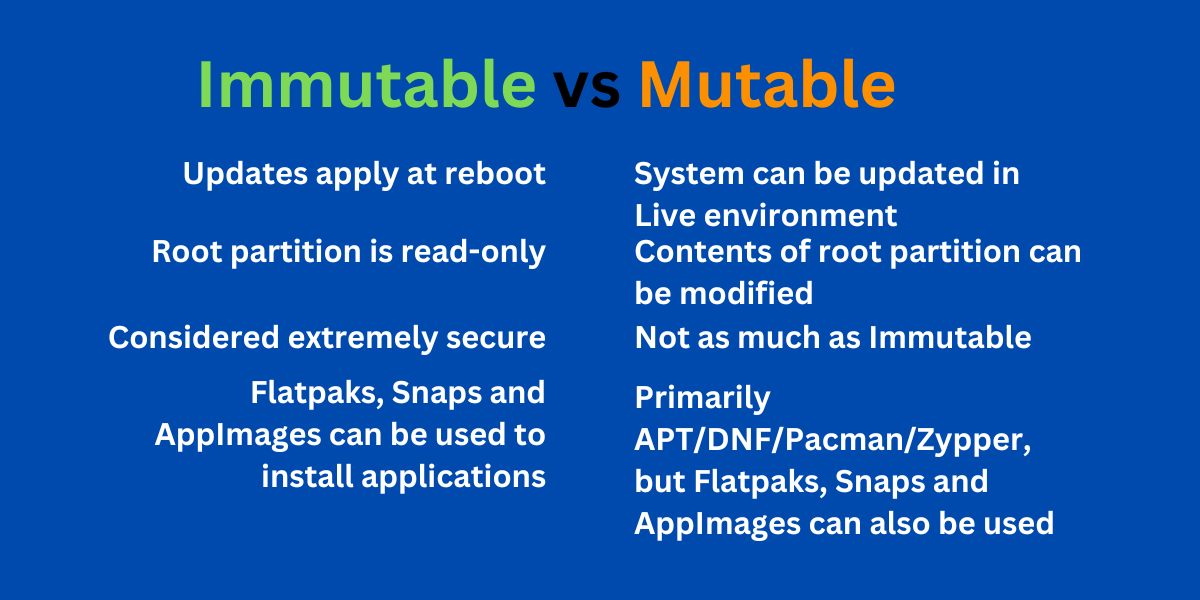this post was submitted on 13 Jan 2025
259 points (95.1% liked)
Linux
49239 readers
5 users here now
From Wikipedia, the free encyclopedia
Linux is a family of open source Unix-like operating systems based on the Linux kernel, an operating system kernel first released on September 17, 1991 by Linus Torvalds. Linux is typically packaged in a Linux distribution (or distro for short).
Distributions include the Linux kernel and supporting system software and libraries, many of which are provided by the GNU Project. Many Linux distributions use the word "Linux" in their name, but the Free Software Foundation uses the name GNU/Linux to emphasize the importance of GNU software, causing some controversy.
Rules
- Posts must be relevant to operating systems running the Linux kernel. GNU/Linux or otherwise.
- No misinformation
- No NSFW content
- No hate speech, bigotry, etc
Related Communities
Community icon by Alpár-Etele Méder, licensed under CC BY 3.0
founded 5 years ago
MODERATORS
you are viewing a single comment's thread
view the rest of the comments
view the rest of the comments

Immutable distros are great for applications where you want uniformity for users and protections against users who are a little too curious for their own good.
SteamOS is a perfect use case. You don't want users easily running scripts on their Steam Decks to install god knows what and potentially wreck their systems, then come to Valve looking for a fix.
Immutable distros solve that issue. Patches and updates for the OS roll out onto effectively identical systems, and if something does break, the update will fail instead of the system. So users will still have a fully functional Steam Deck.
If you're not very technical, or you aren't a power user and packaged apps like Flatpaks are available for all your software, then go for it. I prefer to tinker under the hood with my computers, but I also understand and except the risk that creates.
Immutable distros are a valuable part of a larger, vibrant Linux ecosystem IMO.
Immutable are the ultimate tinkerer's distros. It's just a different way of tinkering. True tinkering in immutable means creating your own image from the base image and that allows you to add or remove packages, change configs, services, etc.
Example: you create your own image. You decide you want to try something, but you're being cautious. So you create a new image based on your first with your changes. You try it out and you don't like it or it doesn't work for some reason, you can just revert back to you other image.
Another thing worth mentioning, with these distros, you can switch between images at will. I'm new to Linux as my daily driver desktop OS, and I've rebased three times. It's really cool to be able to do that.
Don't know why this would be downvoted. Atomic distro's are a tinkerers paradise, as all of it can be done fearlessly. I can make stupid changes to configurations that I don't understand on NixOS, then when things break, simply revert the git commit and rebuild. (Or reboot to the last build if I broke it bad enough).
Who knows. People are passionate about Linux. And downvoting takes no effort. And people downvote stuff randomly.
So Bazzite basically is an immutable 3rd-party SteamOS. It was originally designed for handhelds (though has desktop images now) and includes the Steam Deck's
gamemodepackage. That means it has the same interface, but working on a Legion Go or an Ally X. If anyone here has* any of those three you should seriously check it out!The other thing as well is that more often than not, the update will succeed and you won't figure out until the next boot that something is wrong. However, Bazzite has a rollback tool so you can just change back to the previous image, reboot again and get to gaming.
That's the best reason for immutable for gaming IMO. I don't want to be fucking around with the OS when I'm in the mood to game. Being able to quickly rollback and jump into things in ~10 minutes or less is how it should be.